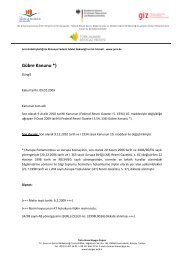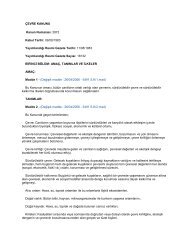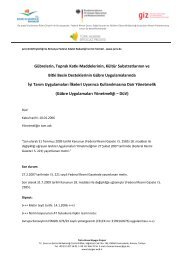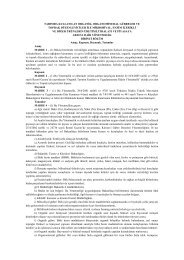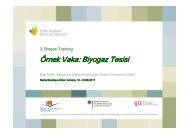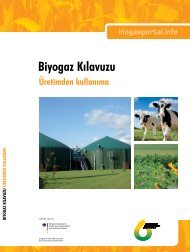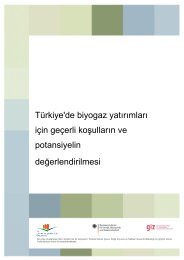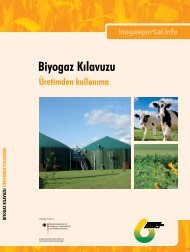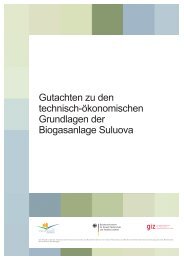Biogas potentials in Turkey - Presentation of Results -
Biogas potentials in Turkey - Presentation of Results -
Biogas potentials in Turkey - Presentation of Results -
You also want an ePaper? Increase the reach of your titles
YUMPU automatically turns print PDFs into web optimized ePapers that Google loves.
<strong>Biogas</strong> <strong>potentials</strong> <strong>in</strong> <strong>Turkey</strong><br />
- <strong>Presentation</strong> <strong>of</strong> <strong>Results</strong> -<br />
Jaquel<strong>in</strong>e Daniel-Gromke, DBFZ<br />
Funda Cansu Ertem, DBFZ<br />
Nadja Rensberg, DBFZ<br />
20 December 2011<br />
This project is part <strong>of</strong> the International Climate Initiative. The German Federal M<strong>in</strong>istry for the Environment, Nature Conservation and Nuclear Safety supports this <strong>in</strong>itiative on the basis <strong>of</strong> a<br />
decision adopted by the German Bundestag.<br />
1
Agenda<br />
Background<br />
Objective and Focus <strong>of</strong> the study<br />
Methodology /Data base<br />
<strong>Results</strong> <strong>of</strong> <strong>Biogas</strong> potential analysis<br />
<strong>Biogas</strong> plants (Overview)<br />
Summary<br />
This project is part <strong>of</strong> the International Climate Initiative. The German Federal M<strong>in</strong>istry for the Environment, Nature Conservation and Nuclear Safety supports this<br />
<strong>in</strong>itiative on the basis <strong>of</strong> a decision adopted by the German Bundestag.<br />
2
Background<br />
The Turkish-German <strong>Biogas</strong>-Project is a German Federal M<strong>in</strong>istry for the<br />
Environment, Natural Conversation and Nuclear Safety funded assistance<br />
project enforced by the GIZ with<strong>in</strong> the scope <strong>of</strong> a Cooperation Agreement,<br />
signed between the Turkish Republic and Federal Republic <strong>of</strong> Germany.<br />
The partner and beneficiary <strong>of</strong> the Project is the M<strong>in</strong>istry <strong>of</strong> Environment and<br />
Urbanisation (MoEU).<br />
The overall objective <strong>of</strong> the project is to develop a susta<strong>in</strong>able biogas production<br />
concept from agricultural residues (e.g. cattle manure) and organic wastes (e.g.<br />
from the agro <strong>in</strong>dustry), <strong>in</strong>troduce organic/natural fertilizer and as a result<br />
reduce carbon emissions.<br />
Moreover the aim is to identify biogas production capacity for a selected<br />
implementation region and establish a practical operat<strong>in</strong>g environment for the<br />
<strong>in</strong>vestors <strong>in</strong> the region, <strong>in</strong> which such enterprises can operate competitively with<br />
German high quality and holistic biogas concept and technology.<br />
This project is part <strong>of</strong> the International Climate Initiative. The German Federal M<strong>in</strong>istry for the Environment, Nature Conservation and Nuclear Safety supports this<br />
<strong>in</strong>itiative on the basis <strong>of</strong> a decision adopted by the German Bundestag.<br />
3
Objectives <strong>of</strong> the Study<br />
Gross estimation <strong>of</strong> biogas potential <strong>of</strong> different sectors (Agricultural<br />
residues, Animal residues, agro-<strong>in</strong>dustrial residues) on a national and<br />
regional level<br />
Gross calculation <strong>of</strong> the total national biogas potential, participation on the<br />
energy mix <strong>in</strong> <strong>Turkey</strong><br />
Availability <strong>of</strong> surplus agricultural land currently not <strong>in</strong> use with potential for<br />
the cultivation <strong>of</strong> energy crops for biogas production<br />
This project is part <strong>of</strong> the International Climate Initiative. The German Federal M<strong>in</strong>istry for the Environment, Nature Conservation and Nuclear Safety supports this<br />
<strong>in</strong>itiative on the basis <strong>of</strong> a decision adopted by the German Bundestag.<br />
4
<strong>Biogas</strong> potential – Focus<br />
<strong>Biogas</strong> calculation on regional level with the focus on:<br />
Animal livestock<br />
Manure from cattle<br />
Manure from poultry (broiler and lay<strong>in</strong>g chicken)<br />
Agricultural area differed to the crops for the calculation <strong>of</strong> the<br />
agricultural byproduct (e.g. straw <strong>of</strong> cereals, maize silage not used as<br />
fodder, sugar beet leaf, tomatoes waste)<br />
Residues from food <strong>in</strong>dustry, slaughterhouses, fruits and vegetables<br />
production (e.g. meat residues, agro-<strong>in</strong>dustrial wastewater, press cake <strong>of</strong><br />
sugar beet, olive press cake)<br />
This project is part <strong>of</strong> the International Climate Initiative. The German Federal M<strong>in</strong>istry for the Environment, Nature Conservation and Nuclear Safety supports this<br />
<strong>in</strong>itiative on the basis <strong>of</strong> a decision adopted by the German Bundestag.<br />
5
<strong>Biogas</strong> potential – Methodology<br />
Data collection<br />
Statistics (M<strong>in</strong>istry data base, data from cattle breeder’s association as<br />
well as egg producer association)<br />
survey food <strong>in</strong>dustry (up to now no data)<br />
<strong>in</strong>formation from actors and experts<br />
K<strong>in</strong>d <strong>of</strong> animal husbandry systems/options for collection <strong>of</strong> manure<br />
Evaluation <strong>of</strong> the data<br />
Calculation <strong>of</strong> the biogas potential accord<strong>in</strong>g to the different sector<br />
Theoretical potential<br />
Technical potential<br />
Identification <strong>of</strong> regions with high biogas potential by summariz<strong>in</strong>g the most<br />
important residues for biogas production <strong>in</strong> <strong>Turkey</strong><br />
This project is part <strong>of</strong> the International Climate Initiative. The German Federal M<strong>in</strong>istry for the Environment, Nature Conservation and Nuclear Safety supports this<br />
<strong>in</strong>itiative on the basis <strong>of</strong> a decision adopted by the German Bundestag.<br />
6
Biomass potential - Def<strong>in</strong>itions<br />
Different k<strong>in</strong>d <strong>of</strong> def<strong>in</strong>itions <strong>of</strong> potential<br />
The study focus on theoretical and technical biogas <strong>potentials</strong><br />
Theoretical potential<br />
Technical potential<br />
Economic potential<br />
Realisable potential<br />
This project is part <strong>of</strong> the International Climate Initiative. The German Federal M<strong>in</strong>istry for the Environment, Nature Conservation and Nuclear Safety supports this<br />
<strong>in</strong>itiative on the basis <strong>of</strong> a decision adopted by the German Bundestag.
CURRENT SITUATION<br />
– <strong>Biogas</strong> Plants -<br />
This project is part <strong>of</strong> the International Climate Initiative. The German Federal M<strong>in</strong>istry for the Environment, Nature Conservation and Nuclear Safety supports this<br />
<strong>in</strong>itiative on the basis <strong>of</strong> a decision adopted by the German Bundestag.<br />
8
<strong>Biogas</strong> plants <strong>in</strong> <strong>Turkey</strong> (Overview)<br />
<strong>Biogas</strong><br />
Plants<br />
<strong>in</strong> operation<br />
Capacity<br />
<strong>in</strong> operation<br />
[MW]<br />
<strong>Biogas</strong><br />
Plants<br />
<strong>in</strong> plann<strong>in</strong>g<br />
Capacity<br />
<strong>in</strong> plann<strong>in</strong>g<br />
[MW]<br />
<strong>Biogas</strong><br />
Plants<br />
total<br />
Total Capacity<br />
[MW]<br />
Total 36 111,234 49 111,756 85 222,99<br />
Agriculture<br />
(animal waste, crops)<br />
Food Industry<br />
(wastewater, organic waste)<br />
Municipality<br />
(landfill gas, wastewater)<br />
Municipality<br />
(landfill gas)<br />
Municipality<br />
(wastewater)<br />
2 0,579 12 11,999 14 12,578<br />
17 13,676 2 3,88 19 17,556<br />
17 96,979 12 34,718 29 131,697<br />
13 93,043 9 32,033 22 125,076<br />
4 3,936 3 2,685 7 6,621<br />
Undef<strong>in</strong>ed 0 0 23 61,159 23 61,159<br />
Data base 12/2011 (GIZ)<br />
This project is part <strong>of</strong> the International Climate Initiative. The German Federal M<strong>in</strong>istry for the Environment, Nature Conservation and Nuclear Safety supports this<br />
<strong>in</strong>itiative on the basis <strong>of</strong> a decision adopted by the German Bundestag.<br />
9
<strong>Biogas</strong> plants <strong>in</strong> <strong>Turkey</strong> (Overview) II<br />
Agriculture<br />
Food Industry<br />
Municipality<br />
12<br />
<strong>Biogas</strong> Plants<br />
<strong>in</strong> operation<br />
2<br />
<strong>Biogas</strong> Plants<br />
<strong>in</strong> operation<br />
12 <strong>Biogas</strong> Plants<br />
<strong>in</strong> operation<br />
2<br />
<strong>Biogas</strong> Plants<br />
<strong>in</strong> plann<strong>in</strong>g<br />
17<br />
<strong>Biogas</strong> Plants<br />
<strong>in</strong> plann<strong>in</strong>g<br />
17<br />
<strong>Biogas</strong> Plants<br />
<strong>in</strong> plann<strong>in</strong>g<br />
11,999<br />
Capacity<br />
<strong>in</strong> operation<br />
[MW]<br />
3,88<br />
Capacity<br />
<strong>in</strong> operation<br />
[MW]<br />
34,718<br />
Capacity<br />
<strong>in</strong> operation<br />
[MW]<br />
0,579<br />
Capacity<br />
<strong>in</strong> plann<strong>in</strong>g<br />
[MW]<br />
13,676<br />
Capacity<br />
<strong>in</strong> plann<strong>in</strong>g<br />
[MW]<br />
96,979<br />
Capacity<br />
<strong>in</strong> plann<strong>in</strong>g<br />
[MW]<br />
Data base 12/2011 (GIZ)<br />
This project is part <strong>of</strong> the International Climate Initiative. The German Federal M<strong>in</strong>istry for the Environment, Nature Conservation and Nuclear Safety supports this<br />
<strong>in</strong>itiative on the basis <strong>of</strong> a decision adopted by the German Bundestag.<br />
10
RESULTS<br />
This project is part <strong>of</strong> the International Climate Initiative. The German Federal M<strong>in</strong>istry for the Environment, Nature Conservation and Nuclear Safety supports this<br />
<strong>in</strong>itiative on the basis <strong>of</strong> a decision adopted by the German Bundestag.<br />
11
Summary: <strong>Biogas</strong> Potential from manure (Cattle + Poultry)<br />
Theoretical biogas potential<br />
In total Cattle + Poultry: 144.366 TJ/year<br />
Technical biogas potential<br />
In total Cattle + Poultry: 78.372 TJ/year<br />
20%<br />
5%<br />
broiler chicken<br />
lay<strong>in</strong>g chicken<br />
54%<br />
36%<br />
broiler chicken<br />
lay<strong>in</strong>g chicken<br />
75%<br />
highest share <strong>of</strong> biogas potential from animal residues <strong>in</strong> <strong>Turkey</strong> results from bov<strong>in</strong>e<br />
10%<br />
This project is part <strong>of</strong> the International Climate Initiative. The German Federal M<strong>in</strong>istry for the Environment, Nature Conservation and Nuclear Safety supports this<br />
<strong>in</strong>itiative on the basis <strong>of</strong> a decision adopted by the German Bundestag.<br />
12
<strong>Biogas</strong> Potential – Summary<br />
Agriculture -<br />
livestock<br />
Agricultural<br />
Residues<br />
Substrate<br />
Theoretical <strong>Biogas</strong><br />
Potential [PJ/year]<br />
Technical<br />
<strong>Biogas</strong><br />
Technical <strong>Biogas</strong> Potential<br />
Potential [PJ/year] [PJ/year]<br />
Cattle Manure 115,9 47,3<br />
Poultry Manure 36,6 36,2<br />
Straw <strong>of</strong> Cereals 276,7 27,7<br />
Sugar beet leaf 17,5 4,4<br />
Tomato Wastes 11,1 4,1<br />
Energy crops Energy Crops on fallow land 300,0 75,0 75,0<br />
83,5<br />
36,1<br />
Agro-Industrial<br />
Residues<br />
Meat production residues 0,5 0,2<br />
Cheese - waste water 2,7 2,4<br />
Sugar beet press cake 5,0 4,5<br />
molasses (sugar production) 3,3 2,9<br />
Olive press cake 1,3 1,2<br />
Olive mill waste water 1,3 1,2<br />
Juice residues (Pomace) 1,8 1,5<br />
Draff (Bioethanol-production) 0,9 0,8<br />
14,7<br />
Municipal Waste Municipal Waste 22,0 11,0 11,0<br />
Total (with energy crops) 796,4 220,4<br />
Total (without energy crops) 496,4 145,4<br />
Total (without energy crops and straw) 219,7 117,7<br />
This project is part <strong>of</strong> the International Climate Initiative. The German Federal M<strong>in</strong>istry for the Environment, Nature Conservation and Nuclear Safety supports this<br />
<strong>in</strong>itiative on the basis <strong>of</strong> a decision adopted by the German Bundestag.<br />
13
<strong>Biogas</strong> Potential – Summary<br />
Theoretical<br />
<strong>Biogas</strong> Potential<br />
[PJ/year]<br />
Technical <strong>Biogas</strong><br />
Potential<br />
[PJ/year]<br />
Sector<br />
Agriculture - livestock 152,5 83,5<br />
Agricultural Residues 305,3 36,1<br />
Energy crops 300,0 75,0<br />
Agro-Industrial Residues 16,6 14,7<br />
Municipal Waste 22,0 11,0<br />
Total (with energy crops) 796,4 220,4<br />
Total (without energy crops) 496,4 145,4<br />
Total (without energy crops and straw) 219,7 117,7<br />
Theoretical <strong>Biogas</strong> Potential [PJ/year]<br />
Technical <strong>Biogas</strong> Potential [PJ/year]<br />
2% 3%<br />
Agriculture - livestock<br />
7%<br />
5%<br />
Agriculture - livestock<br />
38%<br />
19%<br />
Agricultural Residues<br />
Energy crops<br />
34%<br />
38%<br />
Agricultural Residues<br />
Energy crops<br />
38%<br />
Agro-Industrial Residues<br />
Municipal Waste<br />
16%<br />
Agro-Industrial Residues<br />
Municipal Waste<br />
This project is part <strong>of</strong> the International Climate Initiative. The German Federal M<strong>in</strong>istry for the Environment, Nature Conservation and Nuclear Safety supports this<br />
<strong>in</strong>itiative on the basis <strong>of</strong> a decision adopted by the German Bundestag.<br />
14
<strong>Biogas</strong> Potential vs. Energy Demand <strong>in</strong> <strong>Turkey</strong><br />
The range <strong>of</strong> technical biogas potential <strong>of</strong> organic residues <strong>in</strong> <strong>Turkey</strong> (agricultural<br />
residues, municipal waste, residues <strong>of</strong> food <strong>in</strong>dustry) is calculated between<br />
117,7 – 220,4 PJ/year (without/with energy crops and straw) = 32,7 – 61,2 TWh/year<br />
The technical <strong>Biogas</strong> potential can cover:<br />
techn. <strong>Biogas</strong> potential TWh/year<br />
32,7 61,2<br />
related to…<br />
Primary Energy Demand 2,6 4,8<br />
Total Energy consumption 3,4 6,3<br />
RES for energy consumption 37,5 70,2<br />
the share <strong>of</strong> natural gas for energy consumption 20,1 37,5<br />
Electricity production* 6,2 12<br />
RES electricity production* 23,4 43,9<br />
* assumed electrical efficiency 40% for biogas facilities<br />
This project is part <strong>of</strong> the International Climate Initiative. The German Federal M<strong>in</strong>istry for the Environment, Nature Conservation and Nuclear Safety supports this<br />
<strong>in</strong>itiative on the basis <strong>of</strong> a decision adopted by the German Bundestag.<br />
15
Summary<br />
Very less energy-related biomass utilization <strong>in</strong> comparison to the given<br />
biogas <strong>potentials</strong><br />
High biomass potential accord<strong>in</strong>g to the agricultural sector (cattle manure,<br />
poultry manure), but currently unused<br />
Highest biogas potential <strong>of</strong> animal residues results from cattle manure<br />
Utilization <strong>of</strong> animal residues (manure) and agro-<strong>in</strong>dustrial wastewater can<br />
contribute to solve environmental problems (e.g. river polution, groundwater<br />
safety, greenhouse gas reduction)<br />
High straw potential esp. from wheat and barley, but the most part <strong>of</strong> straw is<br />
used for fodder for animal breed<strong>in</strong>g<br />
Calculated technical biogas potential <strong>of</strong> organic residues between<br />
117,7 – 220,4 PJ/year (without/with energy crops and straw) can cover<br />
6 -12% <strong>of</strong> the total electricity production <strong>in</strong> <strong>Turkey</strong><br />
The share or RES for electricity production <strong>in</strong> <strong>Turkey</strong> with 23 - 44%<br />
This project is part <strong>of</strong> the International Climate Initiative. The German Federal M<strong>in</strong>istry for the Environment, Nature Conservation and Nuclear Safety supports this<br />
<strong>in</strong>itiative on the basis <strong>of</strong> a decision adopted by the German Bundestag.<br />
16
Thank you for your attention!<br />
Turkish-German <strong>Biogas</strong> Project<br />
Deutsche Gesellschaft für<br />
Internationale Zusammenarbeit (GIZ) GmbH<br />
And Sokak No: 8/11<br />
06680 Cankaya/Ankara, TURKEY<br />
T +90 312 466 7056<br />
T +49 6196 79830 007<br />
E biogas-tr@giz.de<br />
I www.giz.de<br />
I www.biyogaz.web.tr<br />
Author:<br />
DBFZ<br />
Deutsches BiomasseForschungsZentrum geme<strong>in</strong>nützige<br />
GmbH<br />
Torgauer Straße 116, 04347 Leipzig, GERMANY<br />
This project is part <strong>of</strong> the International Climate Initiative. The German Federal M<strong>in</strong>istry for the Environment, Nature Conservation and Nuclear Safety supports this<br />
<strong>in</strong>itiative on the basis <strong>of</strong> a decision adopted by the German Bundestag.<br />
17




